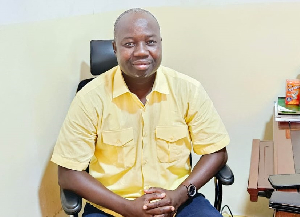 Former Deputy Minister of State, Abu Kansangbata
Former Deputy Minister of State, Abu Kansangbata
A former Deputy Minister of State, Abu Kansangbata, has called on former President John Dramani Mahama and the leadership of the National Democratic Congress (NDC) to undertake a pivotal policy shift that aligns with the expectations of many Ghanaians.
The call focuses on the need to review the 1992 Constitution, specifically to curtail the excessive powers of the executive branch and to reinforce the separation of powers.
Such a review is intended to ensure that Members of Parliament (MPs) can more effectively serve their constituencies by concentrating on legislative duties and oversight, rather than on political appointments.
In a Facebook post, Abu Kansangbata highlighted the necessity for MPs to place national interests above personal ambitions.
Kansangbata contended that amending the constitution to diminish executive powers would lead to a more equitable distribution of authority, thereby improving accountability and governance.
At present, MPs often pursue executive appointments, which can detract from their fundamental role of representing their constituents in Parliament.
However, as Kansangbata points out, many MPs are more preoccupied with securing political appointments than with championing the causes of their constituencies.
This tendency, he said, is harmful to Ghana's democratic ethos, as it prioritises personal gain over the needs of the electorate.
Kansangbata also noted the historical occurrence of a hung parliament following the 2020 parliamentary elections, a first in Ghanaian history.
This development was expected to foster bipartisan cooperation and ensure that both sides of the political aisle work together for the good of the nation.
Nevertheless, he observed that the “hoped-for advantages have not come to fruition as anticipated. Instead, partisan politics continue to overshadow parliamentary activities, with minority members often neglecting to represent the wider interests of Ghanaians.”
He cited the enactment of the Electronic Transactions Levy (E-Levy) bill as a prime example of this disconnection and urged MPs to be more attuned to the needs of their constituents and to engage in substantive dialogue before making significant decisions.
Abu Kansangbata also referred to the recent protests against the Governor of the Bank of Ghana as an indication of widespread dissatisfaction with governmental actions.
These protests, endorsed by a considerable segment of the Ghanaian populace, demanded the prudent and judicious management of the nation's resources. Yet, despite the substantial participation and robust support, the impact of these demonstrations has been minimal.
Kansangbata questioned “the efficacy of such actions and the role of MPs in ensuring government accountability and responsiveness to public concerns.”
He further addressed the politicisation of student leadership.
He underscored the crucial role student leaders have historically played in advocating for the youth's interests and in holding the government to account.
However, he remarked that this role has been compromised as political affiliations increasingly sway student leadership.
This politicisation, he asserted, “hampers the ability of student leaders to act autonomously and to campaign for authentic reform.”
Kansangbata stressed the importance of the youth fulfilling their civic duties and fighting for their fundamental rights, adding, “By doing so, they can improve the prospects for future generations and ensure that the government remains answerable to its citizens.”
ID/AE
Watch the latest Nkommo Wo Ho on GhanaWeb TV below: